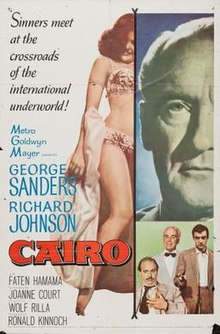
Summary
Cairo is a 1963 American crime film starring George Sanders, Richard Johnson, and Walter Rilla. Directed by Wolf Rilla (Walter's son) and written by Joan LaCour Scott, it was released on August 21, 1963, by Metro-Goldwyn-Mayer.[1][2][3] The film is a nearly scene-for-scene remake of John Huston's 1950 film noir, the The Asphalt Jungle.
| Cairo | |
|---|---|
 Theatrical release poster | |
| Directed by | Wolf Rilla |
| Screenplay by | Joan LaCour Scott |
| Based on | The Asphalt Jungle 1949 novel by W. R. Burnett The Asphalt Jungle 1950 film |
| Produced by | Ronald Kinnoch executive Lawrence Bachmann |
| Starring | George Sanders Richard Johnson Faten Hamama John Meillon Ahmed Mazhar Eric Pohlmann |
| Cinematography | Desmond Dickinson |
| Edited by | Bernard Gribble |
| Music by | Kenneth V. Jones |
Production company | Lawrence P. Bachmann Productions |
| Distributed by | Metro-Goldwyn-Mayer |
Release date |
|
Running time | 91 minutes |
| Country | United States |
| Language | English |
Plot edit
Former British soldier and schemer Major Pickering flies into Cairo on a phony passport. He has had years in a German prison to develop a foolproof plan to rob King Tut's jewels from the Cairo Museum.
He contacts Nicodemos, a shady casino operator and brother of his con artist ex-cellmate, and lays out his bombshell. He declares the daring heist will net a jaw-dropping quarter million dollars.
He then begins to round up a gang to execute his plan. For a safe-cracker he starts with reliable countryman and ex-soldier Willy. An explosive expert and once top “box man”, he's now married to an Egyptian and father of a toddler. Reluctant to join in, he is persuaded by a too big to say no to promise of $25,000.
Which is all it is, as the Major is penniless and needs financial backers. He turns to Nicodemos, who suggests the suave and wealthy Kuchuk, an importer-exporter capable of both funding the job and disposing of its jewels.
Kuchuk is agreeable, but the gang's front money ends up coming out of Nikodimos‘ till instead.
Needing a gunman, the Major next hires hot-headed hashish adict Ali, and as getaway driver the owner of Ali's coffee shop hang-out Kerim.
Kerim is street-smart and sound, but Ali is in an accelerated downward spiral...hounded by the local police, living in squalor, and cold and indifferent to belly dancing girlfriend Amina when she shows up pregnant by him at his rooms. In his torment, he fixates upon the robbery payday as his last chance to buy back the sugarcane farm he was born on outside the city and shake Cairo's urban demons.
Following the Major's meticulous timetable, the safecracking team sneaks into the museum as planned, but accidentally triggers alarms outside it with their explosives. A suspicious guard investigates and is shot, with his gun going off and accidentally hitting Willy. Badly wounded in the gut, he asks to be dropped off at home.
When the Major and Ali arrive that evening at their rendezvous with Kuchuk, he and his trigger-happy accomplice Ghattas attempt to pull an audacious double-cross. In an ensuing shoot-out Ghattas is killed and Ali wounded through his side. Outraged equally at the gambit and its bloodshed, the Major demands Kuchuk propose a deal to the police: $200,000 cash, or the invaluable treasures will be melted into ingots for easy disposal.
Headlines blare, and the noose begins to tighten. A cowardly Nicodemos is rounded up and intimidated into confessing all by a persistent police commandant, Karim is jailed, and Willy dies at home.
Ghattas‘ body is dredged from the river, raising police suspicions toward Kuchuk before he can act. He is put under surveillance. Cornered, he commits suicide.
Ali flees the city by jeep with Amina, and the Major is disguised as a native and set to be floated away on a Nile boat.
Arriving at his old village, Ali's beloved farm is neglected and parched. Delirious, he dies in loyal Amina's arms desperately trying to bring water to it.
The Major, who has a bit too much of an eye for a belly dancer, becomes entranced by one and his boat ghosts off without him. Surrounded by police and resigned to another long prison term, he is arrested without a fight.
Cast edit
- George Sanders as Major Pickering
- Richard Johnson as Ali
- Faten Hamama as Amina
- John Meillon as Willy
- Ahmed Mazhar as Kerim
- Eric Pohlmann as Nicodemos
- Walter Rilla as Kuchuk
- Kamal el-Shennawi as Ghattas
- Salah Nazmi as Police Commandant
- Shwikar as Marie
- Mona Saxena as Bamba
- Abdel Khalek Saleh as Assistant Minister
- Said Abu Bakr as Osman
- Salah Mansour as Doctor
- Mohamed El Sayed as First Officer
- Yousuf Shaaban as Second Officer
- Ezzat El Alaili as Third Officer
- Mohamed Abdel Rahman as Fourth Officer
- Nahed Sabri as First Dancer
- Aziza Hassan as Second Dancer
Production edit
The film reunited the star, producer and director of Village of the Damned (1960).
Filming took place in mid 1962 and involved location shooting in Cairo.[4]
See also edit
References edit
- ^ "Cairo (1963) - Overview - TCM.com". Turner Classic Movies. Retrieved 1 December 2014.
- ^ "Cairo". TV Guide. Archived from the original on 4 December 2014. Retrieved 1 December 2014..
- ^ CAIRO Monthly Film Bulletin; London Vol. 30, Iss. 348, (Jan 1, 1963): 36.
- ^ Sultan and Worth Hit Comedy Jackpot: Brooklyn Boy Wonders Click: Van Johnson Booked in Grove Scheuer, Philip K. Los Angeles Times 28 Mar 1962: C13.
External links edit
- Cairo at IMDb
- Cairo at AllMovie
- Cairo at the TCM Movie Database
- Cairo at the American Film Institute Catalog


